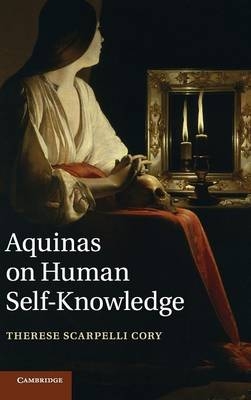
Aquinas on Human Self-Knowledge
Seiten
2013
Cambridge University Press (Verlag)
978-1-107-04292-6 (ISBN)
Cambridge University Press (Verlag)
978-1-107-04292-6 (ISBN)
This engaging treatment of Aquinas's theory of self-knowledge provides a comprehensive look at a neglected aspect of medieval philosophy, from both a historical and a philosophical perspective. It will be valuable to specialists and advanced students in medieval philosophy, the philosophy of mind and the history of ideas.
Self-knowledge is commonly thought to have become a topic of serious philosophical inquiry during the early modern period. Already in the thirteenth century, however, the medieval thinker Thomas Aquinas developed a sophisticated theory of self-knowledge, which Therese Scarpelli Cory presents as a project of reconciling the conflicting phenomena of self-opacity and privileged self-access. Situating Aquinas's theory within the mid-thirteenth-century debate and his own maturing thought on human nature, Cory investigates the kinds of self-knowledge that Aquinas describes and the questions they raise. She shows that to a degree remarkable in a medieval thinker, self-knowledge turns out to be central to Aquinas's account of cognition and personhood, and that his theory provides tools for considering intentionality, reflexivity and selfhood. Her engaging account of this neglected aspect of medieval philosophy will interest readers studying Aquinas and the history of medieval philosophy more generally.
Self-knowledge is commonly thought to have become a topic of serious philosophical inquiry during the early modern period. Already in the thirteenth century, however, the medieval thinker Thomas Aquinas developed a sophisticated theory of self-knowledge, which Therese Scarpelli Cory presents as a project of reconciling the conflicting phenomena of self-opacity and privileged self-access. Situating Aquinas's theory within the mid-thirteenth-century debate and his own maturing thought on human nature, Cory investigates the kinds of self-knowledge that Aquinas describes and the questions they raise. She shows that to a degree remarkable in a medieval thinker, self-knowledge turns out to be central to Aquinas's account of cognition and personhood, and that his theory provides tools for considering intentionality, reflexivity and selfhood. Her engaging account of this neglected aspect of medieval philosophy will interest readers studying Aquinas and the history of medieval philosophy more generally.
Therese Scarpelli Cory is Assistant Professor of Philosophy at the University of Notre Dame, Indiana.
Introduction; Part I. Historical and Textual Origins: 1. The development of a medieval debate; 2. The trajectory of Aquinas's theory of self-knowledge, 1252–72; Part II. Phenomena and Problems: 3. Perceiving myself: the content of actual self-awareness; 4. Perceiving myself: is self-awareness an intuitive act?; 5. The significance of self-presence: habitual self-awareness; 6. Implicit vs explicit self-awareness and the duality of conscious thought; 7. Discovering the soul's nature: quidditative self-knowledge; 8. Self-knowledge and psychological personhood; Conclusion.
| Erscheint lt. Verlag | 7.11.2013 |
|---|---|
| Verlagsort | Cambridge |
| Sprache | englisch |
| Maße | 160 x 231 mm |
| Gewicht | 510 g |
| Themenwelt | Geisteswissenschaften ► Philosophie ► Erkenntnistheorie / Wissenschaftstheorie |
| Geisteswissenschaften ► Philosophie ► Philosophie des Mittelalters | |
| Geisteswissenschaften ► Religion / Theologie | |
| ISBN-10 | 1-107-04292-5 / 1107042925 |
| ISBN-13 | 978-1-107-04292-6 / 9781107042926 |
| Zustand | Neuware |
| Haben Sie eine Frage zum Produkt? |
Mehr entdecken
aus dem Bereich
aus dem Bereich
die Grundlegung der modernen Philosophie
Buch | Softcover (2023)
C.H.Beck (Verlag)
18,00 €
Buch | Softcover (2023)
Reclam, Philipp (Verlag)
7,00 €

![Was heißt Denken?. Vorlesung Wintersemester 1951/52. [Was bedeutet das alles?] - Martin Heidegger](/media/113619842)
